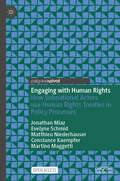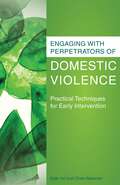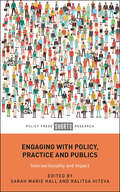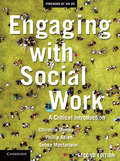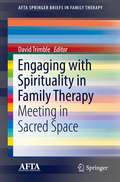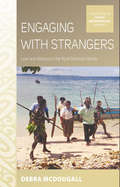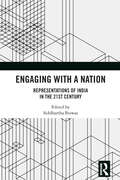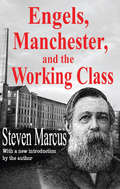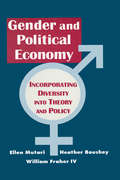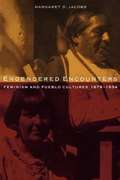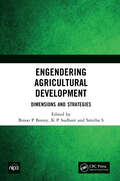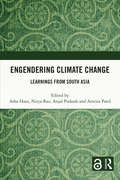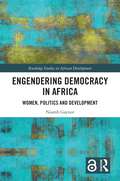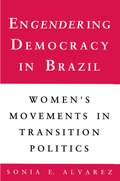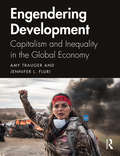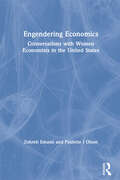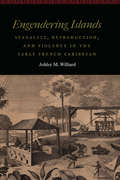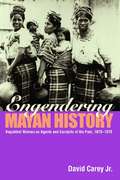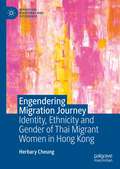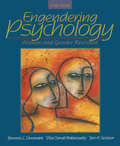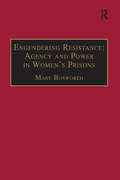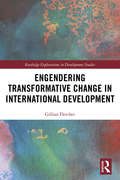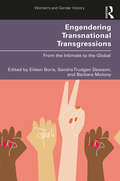- Table View
- List View
Engaging with Human Rights: How Subnational Actors use Human Rights Treaties in Policy Processes (Palgrave Socio-Legal Studies)
by Martino Maggetti Evelyne Schmid Jonathan Miaz Matthieu Niederhauser Constance KaempferMaking human rights a reality requires that various types of domestic actors take measures, which is often demanding, all the more so in federal systems. This open access book, Engaging with Human Rights: How Subnational Actors use Human Rights Treaties in Policy Processes, shows that an important part is played at the subnational level, with repeated back-and-forth between and within levels of governance rather than a ‘top-down’ trajectory. The dynamics of implementation at national and sub-national level is an emerging area of study. This book explores how actors use human rights treaties in the policy process, sometimes leading to an engagement that increases human rights implementation, and at other times not. Treaties provide both opportunities and constraints. Switzerland, as a highly decentralized federal state, offers a perfect setting to study the processes at work. Using legal, political, and sociological analyses, the authors draw on over 65 semi-structured interviews and focusses on two topical case studies: violence against women, including domestic violence, and the rights of persons with disabilities. This book provides a blueprint for other researchers and practitioners who wish to study the concrete implementation and impacts of human rights obligations.
Engaging with Perpetrators of Domestic Violence: Practical Techniques for Early Intervention
by Kate Iwi Chris NewmanChild protection and family workers can complete training without learning about how to work with domestic abuse perpetrators - but intervening at an early stage can make a real difference to increasing family safety. This concise book equips practitioners with the knowledge and techniques they need to make the most of limited client contact with perpetrators. It outlines how to briefly assess perpetrators, how to prepare them for a perpetrator programme, and describes a range of interventions that can be used to reduce the risk they represent in the meantime. Drawing on approaches from motivational work, anger management, CBT and feminist models, but written in practical and easy to follow language, the book provides guidance for carrying out interviews and assessing risk, how to use safety plans, signals and time outs, understanding the impact of abuse on victims, how to analyse incidents of abuse and how to make an effective referral. This reliable guide is a useful reference for any child protection worker wanting to make the most of the valuable opportunity they have to engage with domestic violence perpetrators.
Engaging with Policy, Practice and Publics: Intersectionality and Impact
by Sarah Marie Hall and Ralitsa HitevaAvailable Open Access under CC-BY-NC licence. Engagement with non-academic groups and actors – such as policy-makers, industry, charities and activist groups, communities, and the public – in the co-production of knowledge and real-world impact is increasingly important in academic research. Drawing on empirical research, interdisciplinary methodologies, and broad international perspectives, this collection offers a critical examination of the liminal space of interactions between policy and research as spaces of difference and engagement, showing them to be far from apolitical. The authors consider what, and who, are present in these encounter spaces and examine how pre-existing perceptions about differences in social identity, positionality and knowledge can affect engagement, equity and research outcomes.
Engaging with Social Work: A Critical Introduction
by Phillip Ablett Christine Morley Selma MacfarlaneContemporary global challenges require practitioners to confidently analyse the dominant discourses and develop frameworks and strategies for future change. Engaging with Social Work equips students with a critical perspective and develops their understanding of social work and human services practice, with an emphasis on the principles of social justice and human rights. This fully revised second edition includes a new chapter on the emerging challenges and opportunities for social work, covering rising global inequality, re-invigorated possibilities for addressing violence against women, and threats to the planet. Aboriginal and Torres Strait Islander perspectives are integrated throughout the text to provide a more in-depth understanding. Reflective exercises, key definitions, case studies and unique practitioners' perspectives are integrated into each chapter to support learning. Engaging with Social Work provides an accessible, research-informed and rigorous introduction to complex concepts, theories and analyses, and develops a solid skill-set to prepare students for professional practice.
Engaging with Spirituality in Family Therapy: Meeting In Sacred Space (Afta Springerbriefs In Family Therapy Ser.)
by David TrimbleThis inspiring volume presents a unique and ethical professional framework for engaging in spiritual discussion in the context of family therapy. Addressing existential contradictions of life that can disrupt family functioning as well as religious restrictions that can create relational barriers, it models an open frame of mind for sensitive and respectful metaphysical work with diverse families. Chapter authors build on their own narratives of spiritual journey as they inform conversation with clients whose faith perspectives include Christianity, Judaism, Islam, African and Native American spiritual practice, Taoism, and Sikhism. These powerful dialogues illuminate the deeper tasks of therapy and offer significant opportunities for all family members to be involved in creating meaning and healing together.This one-of-a-kind book:Presents the narratives of a racially, culturally, and religiously diverse group of authorsExplores the challenges of metaphysical psychotherapeutic practiceFocuses on the intersection of therapeutic practice and spirituality in various cultural contextsGuides therapists in looking into their own spiritual lives and experienceModels methods for therapists using spirituality in sessions with familiesChallenging professionals to step beyond the perceived boundaries of the therapist/client relationship, Engaging with Spirituality in Family Therapy: Meeting in Sacred Space is rich and eloquent reading for practitioners and researchers in family therapy.
Engaging with Strangers: Love and Violence in the Rural Solomon Islands (ASAO Studies in Pacific Anthropology #6)
by Debra McdougallThe civil conflict in Solomon Islands (1998-2003) is often blamed on the failure of the nation-state to encompass culturally diverse and politically fragmented communities. Writing of Ranongga Island, the author tracks engagements with strangers across many realms of life-pre-colonial warfare, Christian conversion, logging and conservation, even post-conflict state building. She describes startling reversals in which strangers become attached to local places, even as kinspeople are estranged from one another and from their homes. Against stereotypes of rural insularity, she argues that a distinctive cosmopolitan openness to others is evident in the rural Solomons in times of war and peace.
Engaging with a Nation: Representations of India in the 21st Century
by Siddhartha BiswasThe book looks at the impact that the idea and institution of nationhood have had on the constituents of India in the contemporary postcolonial period. It provides a critical analysis through a variety of perspectives––historical, philosophical, literary, and gendered, and locates the nation and its “discontents”, along with its nationalist agenda firmly within the context of the contemporary perceived modernity. The book also engages with the colonial legacy that the ‘nation’ had to endure for two hundred years. It discusses key themes such as nationalism in the contemporary Indian context, the concept of Hindutva, Islam nationalism, and queer nationalism.An important contribution, this book will be of interest to students and scholars of India studies, Indian politics, Third World studies, postcolonial studies, gender studies, nation studies, and history.
Engels Revisited: Feminist Essays (Routledge Revivals)
by Mary Evans Janet Sayers Nanneke RedcliftThis reissued work, first published in 1987, examines the problematic and divisive attitudes which bourgeois and socialist feminists take to the question of the links between patriarchy and capitalism and the importance of class conflict as a major cause of women's subordination. Engels still occcupies a central role in this debate and feminists writing in the hundred years since the publication of The Origin of the Family, Private Property and the State frequently turn to this book in an attempt to find validation for their central argument. The contributors to this volume reconsider Engels' theories and review evidence from those societies that have attempted to implement his belief that the key to the emancipation of women lies in their entry to social production.
Engels, Manchester, and the Working Class
by Steven MarcusFriedrich Engels' first major work, The Condition of the Working Class in England in 1844, has long been considered a social, political, and economic classic. The first book of its kind to study the phenomenon of urbanism and the problems of the modern city, Engels' text contains many of the ideas he was later to develop in collaboration with Karl Marx. In this book, Steven Marcus, author of the highly acclaimed The Other Victorians, applies himself to the study of Engels' book and the conditions that combined to produce it.Marcus studies the city of Manchester, centre of the first Industrial Revolution, between 1835 and 1850 when the city and its inhabitants were experiencing the first great crisis of the newly emerging industrial capitalism. He also examines Engels himself, son of a wealthy German textile manufacturer, who was sent to Manchester to complete his business education in the English cotton mills.Touching upon several disciplines, including the history of socialism, urban sociology, Marxist thought, and the history and theory of the Industrial Revolution, Engels, Manchester, and the Working Class offers a fascinating study of nineteenth-century English literature and cultural life.
Engendered Economics: Incorporating Diversity into Political Economy
by Heather Boushey Ellen Mutari William FraherThis book provides an overview of current developments within feminist political economy, including reformulations of economic theory, historical and empirical research on the economic roles and status of women and people of color, as well as proposals for broadening the public policy agenda. Rather than offering a feminist critique of neoclassical economics, this volume presents feminist economics in dialogue with progressive economic theory and public policy. It differentiates itself further by addressing issues of class, race and sexuality in interaction with gender.
Engendered Encounters: Feminism and Pueblo Cultures 1879-1934
by Margaret D. JacobsIndians in old discusses the situation of Pueblo women and the perception of that situation by white women.
Engendering Agricultural Development: Dimensions and Strategies
by K. P. Sudheer Binoo P. Bonny S. SmithaThis book is an attempt to comprehend and compile the history, present status, and future trends of the gender roles in agriculture. The book comprises of three divisions viz., Gender in agriculture development (Part I), Gender in allied sectors of agriculture (Part II) and Data, Tools and approaches in gender analysis (Part III), that explicates the prevalent gendered relegations. It provides insights on the gender dimensions in Indian agriculture, including initiatives, policy reforms and mends the literature gap in gender roles in the sector. The gender roles and impacts from different cultural and geographical horizons of agricultural and allied sectors in the emerging contexts of globalization, urbanization, climate change and the Covid19 pandemic are discussed in the book. It will be helpful to academics, researchers, students, and social workers who strive towards a gender-neutral world. Print and electronic editions not for sale in South Asia (India, Sri Lanka, Nepal, Bangladesh, Pakistan, Afghanistan and Bhutan).
Engendering Climate Change: Learnings from South Asia
by Anjal Prakash Asha Hans Nitya Rao Amrita PatelThis book focuses on the gendered experiences of environmental change across different geographies and social contexts in South Asia and on diverse strategies of adapting to climate variability. The book analyzes how changes in rainfall patterns, floods, droughts, heatwaves and landslides affect those who are directly dependent on the agrarian economy. It examines the socio-economic pressures, including the increase in women’s work burdens both in production and reproduction on gender relations. It also examines coping mechanisms such as male migration and the formation of women’s collectives which create space for agency and change in rigid social relations. The volume looks at perspectives from India, Pakistan, Bangladesh and Nepal to present the nuances of gender relations across borders along with similarities and differences across geographical,socio-cultural and policy contexts. This book will be of interest to researchers and students of sociology, development, gender, economics, environmental studies and South Asian studies. It will also be useful for policymakers, NGOs and think tanks working in the areas of gender, climate change and development.
Engendering Democracy in Africa: Women, Politics and Development (Routledge Studies in African Development)
by Niamh GaynorThis book investigates women’s political participation in Africa. Going beyond the formal institutions of electoral politics, it explores a range of spaces where everyday politics take place, at national and at local levels. In recent years there have been significant improvements in the number of women elected to parliament in Africa. However, there is little indication that this is translating into better developmental outcomes, and indeed there is mounting evidence that it could in fact help to bolster some authoritarian regimes. Starting from the premise that politics is a far broader project than securing a seat in national or local legislatures alone, this book explores the opportunities for women’s political participation across a number of informal spaces where women and men gather, organise and interact in a more regular and systematic manner. Combining insights from political science, sociology and feminist theory and drawing on detailed cases from the Congo, Kenya, Malawi, Nigeria and Rwanda, it examines how power in its multiple dimensions circulates across a range of everyday political spaces, while drawing attention to the links between domestic gender inequalities and the global political economy. Inviting scholars, practitioners and activists to broaden their focus beyond formal electoral institutions if they want to support women to become more politically active, this book provides fresh insights into major issues at the heart of African studies, development studies, gender and development, democratisation, and international relations.
Engendering Democracy in Brazil: Women's Movements in Transition Politics
by Sonia E. AlvarezBrazil has the tragic distinction of having endured the longest military-authoritarian regime in South America. Yet the country is distinctive for another reason: in the 1970s and 1980s it witnessed the emergence and development of perhaps the largest, most diverse, most radical, and most successful women's movement in contemporary Latin America. This book tells the compelling story of the rise of progressive women's movements amidst the climate of political repression and economic crisis enveloping Brazil in the 1970s, and it devotes particular attention to the gender politics of the final stages of regime transition in the 1980s.Situating Brazil in a comparative theoretical framework, the author analyzes the relationship between nonrevolutionary political change and changes in women's consciousness and mobilization. Her engaging analysis of the potentialities for promoting social justice and transforming relations of inequality for women and men in Latin America and elsewhere in the Third World makes this book essential reading for all students and teachers of Latin American politics, comparative social movements and public policy, and women's studies and feminist political theory.
Engendering Development: Capitalism and Inequality in the Global Economy
by Jennifer L. Fluri Amy TraugerEngendering Development demonstrates how gender is a form of inequality that is used to generate global capitalist development. It charts the histories of gender, race, class, sexuality and nationality as categories of inequality under imperialism, which continue to support the accumulation of capital in the global economy today. The textbook draws on feminist and critical development scholarship to provide insightful ways of understanding and critiquing capitalist economic trajectories by focusing on the way development is enacted and protested by men and women. It incorporates analyses of the lived experiences in the global north and south in place-specific ways. Taking a broad perspective on development, Engendering Development draws on textured case studies from the authors’ research and the work of geographers and feminist scholars. The cases demonstrate how gendered, raced and classed subjects have been enrolled in global capitalism, and how individuals and communities resist, embrace and rework development efforts. This textbook starts from an understanding of development as global capitalism that perpetuates and benefits from gendered, raced and classed hierarchies. The book will prove to be useful to advanced undergraduate and graduate students enrolled in courses on development through its critical approach to development conveyed with straightforward arguments, detailed case studies, accessible writing and a problem-solving approach based on lived experiences.
Engendering Economics: Conversations with Women Economists in the United States
by Zohreh Emami Paulette I OlsonBy the 1950s the percentage of all economic doctorates awarded to women had dropped to a record low of less than five percent.By presenting interviews with the female economists who received PhD's between 1950 and 1975, this book provides a richer understanding of the sociology of the economics profession. Their post-war experiences as family members, students and professionals, illustrate the challenges that have been faced by women, including both white and African-American women, in a white male dominated profession.Engaging and insightful, the impressive scope of philosophical perspectives, career paths, research interests, feminist inclinations, and observations about the economics profession and women's place within it, will appeal to anyone interested in economics, sociology and gender studies.
Engendering Islands: Sexuality, Reproduction, and Violence in the Early French Caribbean (Women and Gender in the Early Modern World)
by Ashley M. WilliardIn seventeenth-century Antilles the violence of dispossession and enslavement was mapped onto men&’s and women&’s bodies, bolstered by resignified tropes of gender, repurposed concepts of disability, and emerging racial discourses. As colonials and ecclesiastics developed local practices and institutions—particularly family formation and military force—they consolidated old notions into new categories that affected all social groups. In Engendering Islands Ashley M. Williard argues that early Caribbean reconstructions of masculinity and femininity sustained occupation, slavery, and nascent ideas of race. In the face of historical silences, Williard&’s close readings of archival and narrative texts reveals the words, images, and perspectives that reflected and produced new ideas of human difference. Juridical, religious, and medical discourses expose the interdependence of multiple conditions—male and female, enslaved and free, Black and white, Indigenous and displaced, normative and disabled—in the islands claimed for the French Crown. In recent years scholars have interrogated key aspects of Atlantic slavery, but none have systematically approached the archive of gender, particularly as it intersects with race and disability, in the seventeenth-century French Caribbean. The constructions of masculinity and femininity embedded in this early colonial context help elucidate attendant notions of otherness and the systems of oppression they sustained. Williard shows the ways gender contributed to and complicated emerging notions of racial difference that justified slavery and colonial domination, thus setting the stage for centuries of French imperialism.
Engendering Mayan History: Kaqchikel Women as Agents and Conduits of the Past, 1875-1970
by David Carey Jr.Presenting Mayan history from the perspective of Mayan women--whose voices until now have not been documented--David Carey allows these women to present their worldviews in their native language, adding a rich layer to recent Latin American historiography, and increasing our comprehension of indigenous perspectives of the past.Drawing on years of research among the Maya that specifically documents women's oral histories, Carey gives Mayan women a platform to discuss their views on education, migrant labor, work in the home, female leadership, and globalization. These oral histories present an ideal opportunity to understand indigenous women's approach to history, the apparent contradictions in gender roles in Mayan communities, and provide a distinct conceptual framework for analyzing Guatamalan, Mayan, and Latin American history.
Engendering Migrant Health
by Denise L. SpitzerVoluntary migrants to Canada are generally healthier than the average Canadian, but after ten years in the country they report poorer health and higher rates of chronic disease than those born here. Troublingly, women -- particularly those from non-European countries -- experience the most precipitous decline in health. What contributes to this deterioration, and how can its effects be mitigated?Engendering Migrant Health brings together researchers from across Canada to address the intersections of gender, immigration, and health in the lives of new Canadians. Focusing on the context of Canadian policy and society, the contributors illuminate migrants' testimonies of struggle, resistance, and solidarity as they negotiate a place for themselves in a new country. Topics range from the difficulties of Francophone refugees and the changing roles of fathers, to the experiences of queer newcomers and the importance of social unity to communal and individual health.
Engendering Migration Journey: Identity, Ethnicity and Gender of Thai Migrant Women in Hong Kong (Migration, Diasporas and Citizenship)
by Herbary ZhangDrawing on ethnographic research conducted with the Thai migrant community in Hong Kong between 2016 and 2020, this book provides original insights into the complexity and diversity of identity negotiation, ethnicity navigation, and womanhood reinvention of Thai migrant women in Hong Kong. Allowing research to move beyond standard stories of victimized migrants and domestic workers by focusing on the increasing number of Southeast Asians moving into the middle-class, this ethnographic study of the everyday lived experience of Thai migrant women in Hong Kong will advance a new understanding of transnational migration and mobility at the intersections of gender, ethnicity, class, generation, and religion. This book illustrates the influence of transnationalism and multiculturalism on migrant women's meaning-making and accentuates the importance of diversity within a migrant population — in particular, the importance of maintaining an intersectional perspective to understand the broader phenomenon of contemporary middle-class and professional migration within Southeast Asia.
Engendering Psychology: Women and Gender Revisited
by Florence Denmark Vita Carulli Rabinowitz Jeri A. SechzerEngendering Psychology's treatment of issues is based solidly on scientific evidence and presented in a balanced manner. The text combines a developmental and topical approach. Denmark, Rabinowitz, and Sechzer explore the concept of gender as a social construction across the lines of race, ethnicity, class, age, and sexual orientation, pulling from the exciting new scholarship that has emerged over the last few years. Thoughtful discussion questions emphasize critical thinking skills, as well as encourage students to open a dialogue with both their professors and their peers. This text will help readers understand the concept of gender as a social construct in contrast to the concept of sex, which denotes biological differences. Upon completing this text, readers will have a deeper understanding of women and the knowledge that "woman" is a diverse and multifaceted category.
Engendering Resistance: Agency and Power in Women's Prisons (New Advances in Crime and Social Harm #6)
by Mary BosworthThis book explores how power is negotiated in women’s prisons. Drawing on fieldwork conducted in three penal establishments in England, it analyses how women manage the restrictions of imprisonment and the manner in which they attempt to resist institutional control. It is proposed that power is negotiated on a private, individual level, as women often resist the institution simply by trying to maintain an image of control over their own lives. However, their image of themselves as active, reasoning agents is undermined by institutional regimes which encourage traditional, passive, feminine behaviour at the same time as they deny the women their identities and responsibilities as mothers, wives, girlfriends and sisters. Femininity is, therefore, both the form and the goal of women’s imprisonment. Yet paradoxically, femininity also offers the possibility of resistance, because women manage to rebel by appropriating and changing aspects of it.
Engendering Transformative Change in International Development (Routledge Explorations in Development Studies)
by Gillian FletcherThe Sustainable Development Goals were launched in 2015 with grand ambitions for ending poverty, protecting the planet, and ensuring prosperity for all, with ‘no one left behind’. However, these goals will be impossible to achieve without addressing inequity, inequality, marginalisation, and exclusion related to gender, and to other intersecting social hierarchies linked to deeply emotional, culturally bound norms and judgements of worth. This book asks readers to consider issues of knowledge, power, and effectiveness, emphasising the limits of taking a categorical approach to gender and other social hierarchies, and the importance of process in what is known about generating transformative social change. Engendering Transformative Thinking and Practice in International Development draws on a range of real world examples which demonstrate both the limitations of the frameworks currently in use, and the very real possibilities for change when the intersecting social hierarchies that sustain and create inequity and inequality are challenged. This book brings together theoretical perspectives on social change, gender, intersectionality, and forms of knowledge, concluding with a set of proposals for revitalising a change agenda that recognises and engages with intersectionality and practical wisdom. Perfect for students and scholars of social change, gender, and development, this book will also be useful for practitioners looking for new ideas to help to generate social change.
Engendering Transnational Transgressions: From the Intimate to the Global (Women's and Gender History)
by Eileen Boris Barbara Molony Sandra Trudgen DawsonEngendering Transnational Transgressions reclaims the transgressive side of feminist history, challenging hegemonic norms and the power of patriarchies. Through the lenses of intersectionality, gender analysis, and transnational feminist theory, it addresses the political in public and intimate spaces. The book begins by highlighting the transgressive nature of feminist historiography. It then divides into two parts—Part I, Intimate Transgressions: Marriage and Sexuality, examines marriage and divorce as viewed through a transnational lens, and Part II, Global Transgressions: Networking for Justice and Peace, considers political and social violence as well as struggles for relief, redemption, and change by transnational networks of women. Chapters are archivally grounded and take a critical approach that underscores the local in the global and the significance of intersectional factors within the intimate. They bring into conversation literatures too often separated: history of feminisms and anti-war, anti-imperial/anti-fascist, and related movements, on the one hand, and studies of gender crossings, marriage reconstitution, and affect and subjectivities, on the other. In so doing, the book encourages the reader to rethink standard interpretations of rights, equality, and recognition. This is the ideal volume for students and scholars of Women’s and Gender History and Women’s and Gender Studies, as well as International, Transnational, and Global History, History of Social Movements, and related specialized topics.
